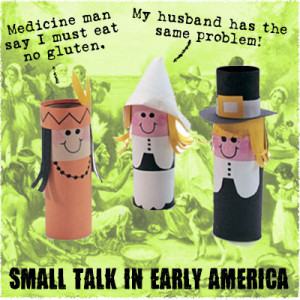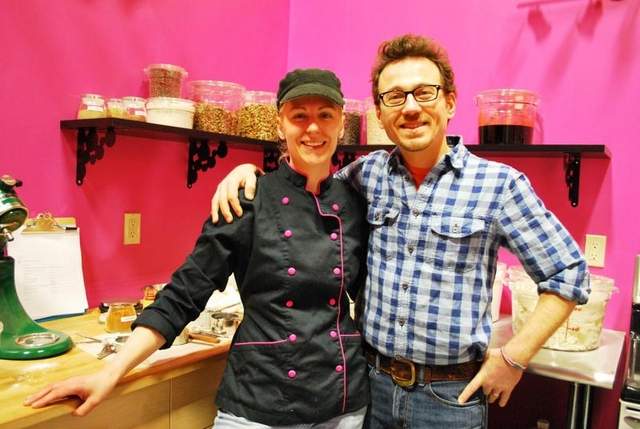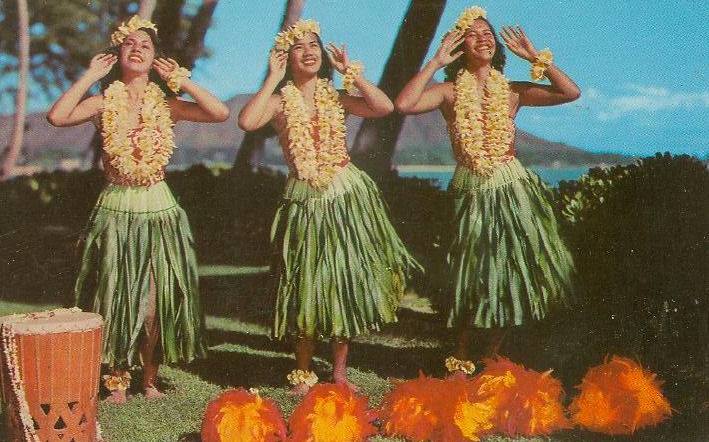Content Warning: Racism and white-washing of indigenous genocide.
Alright folks, let’s play “Cowboys & Indians.” Guess who loses again?
In 2013, Liz Lovely (a Vermont-based vegan cookie business) posted the above Thanksgiving meme in their fan club newsletter, and met with a number of well-earned criticisms.
The cartoon depicts a Native American character in cliché garb (headbands are a white Hollywood invention) who speaks with broken English. The broken English stereotype is meant to emphasize Native American ignorance and white “settler” superiority, while the “Medicine Man” trope also used here draws on the problematic stereotype of the “mystical Indian.”
Another issue raised in this cartoon is the white-washing of institutionalized violence inflicted on indigenous populations with the arrival of European colonizers. These intruders arrived uninvited, attempted to colonize regions already inhabited by indigenous communities, and almost all of them died from cold, illness, and hunger in this failed attempt at conquest. Local tribes assisted survivors, only for more European boats to arrive with more white people who would soon pass on their deadly diseases, exploit the land, and declare war on the native population. This history is made invisible in the smiling faces of the toilet roll caricatures.
In a nutshell, Liz Lovely, a white-owned company, is exploiting a stereotype of a heavily oppressed indigenous population to sell expensive white people cookies to other white people.
So, they boobooed. It happens. But instead of making it right with a sincere apology and retraction, they made it worse. Way worse.
Following complaints, the cartoon was deleted and Liz Lovely followed up with a mean-spirited not-pology to clear the air (emphasis added):
Message from Cowboy Dan:
First, let me apologize for unintentionally offending Native Americans (and somehow also people who are not Native American, but are extremely sensitive). I am not a racist, I am not ignorant of the plight of Native Americans, and I was not seeking to degrade their heritage.
I knowingly played on a well-established media stereotype to make a silly joke about the first Thanksgiving, assuming the construction paper cutouts would tip people off that it was meant to be ridiculous ~ like an SNL skit for example.
This is not the first content-complaint I’ve received on the fan club. Although, this may be the most well-founded. And while Liz and I like our sense of humor, we understand that it’s not for everyone.
So moving forward, the fan club will be simpler [ . . . ]
Thank you so much for being fans and supporters.
Liz Lovely is sorry that the reader took offense. So, it is not really sorry at all. It’s the reader’s fault for being offended, not Liz Lovely’s for offending you. See, “Cowboy Dan” “gets” the issues, and his post was so obviously “ridiculous,” it doesn’t count as racism. After all, these racist stereotypes are “well-established,” so what’s the harm? Cowboy Dan does not identify as a racist, so that means he can’t be racist.
But simply declaring yourself not racist does not actually make you not racist . . . it’s your actions that define you.
By signing off with a thanks to fans and supporters, Cowboy Dan insinuates that his intended or perceived audience is a white one. Liz Lovely makes it clear that the message is really intended for those who are either 1) not Native American, or, 2) persons of color who respect white supremacy; those who are not “extremely sensitive” and can “take a joke.”
The content of the comments on Liz Lovely’s Facebook page that followed the announcement attest to the boundary work of this white space. For instance, one theme was the elevation of cookies over injustice:
Love your humor….but really LOVE THOSE COOKIES!!!
Can’t we all just get along for the sake of DELICIOUS COOKIES!!
Another theme was the dismissal of racism:
People need to stop being so damn sensitive. Bunch of stupid, ugly, butt hurt losers.
I didn’t see it, but am aware that in general society has become far too sensitive. You make a fantastic product, I find you guys to be pretty funny. You can’t please everyone.
Unsubscribe if you’re that easily offended so the rest of us don’t have to walk on egg shells around you!
Seriously, people … if you’re that easily offended, how do you survive in this world? Get over yourselves. It’s a joke. So you didn’t find it funny. Have a cookie and move on.
Those who mind don’t matter and those who matter don’t mind. If we’re looking for a reason to be offended, we’ll always find one. Words to live by from two of my favorite people, Dr. Seuss and Wayne Dyer. BTW, I love your cookies!!
People are WAY TOO SENSITIVE and need to calm down! Being “politically correct” has gone over the top.
And “reverse racism”:
Why is no one offended about the pilgrims?
Because pilgrims are white, and everyone knows any sort of racist tones don’t apply to white people.
Finally, don’t like it? Go elsewhere:
Wow now people are analyzing the sincerity of an apology for a humorous and post that was deleted? Like that was really the most bothersome thing you saw online today – Grow up! If it bothered you that much unlike the page and spend your $ elsewhere.
…which is exactly what countless oppressed persons of color who are regularly made to feel unwelcome in vegan spaces frequently do.
It should be no wonder as to why veganism is viewed as pretentious, elitist, and frivolous when racism is openly supported and people of color are harassed, marginalized, or erased entirely.
Note: The Food Empowerment Project does not recommend Liz Lovely Cookies because it does not source its chocolate ethically. Much of the world’s chocolate comes from child slavery.
 Dr. Wrenn is Lecturer of Sociology. She received her Ph.D. in Sociology with Colorado State University in 2016. She received her M.S. in Sociology in 2008 and her B.A. in Political Science in 2005, both from Virginia Tech. She was awarded Exemplary Diversity Scholar, 2016 by the University of Michigan’s National Center for Institutional Diversity. She served as council member with the American Sociological Association’s Animals & Society section (2013-2016) and was elected Chair in 2018. She serves as Book Review Editor to Society & Animals and has contributed to the Human-Animal Studies Images and Cinema blogs for the Animals and Society Institute. She has been published in several peer-reviewed academic journals including the Journal of Gender Studies, Feminist Media Studies, Disability & Society, Food, Culture & Society, and Society & Animals. In July 2013, she founded the Vegan Feminist Network, an academic-activist project engaging intersectional social justice praxis. She is the author of A Rational Approach to Animal Rights: Extensions in Abolitionist Theory (Palgrave MacMillan 2016).
Dr. Wrenn is Lecturer of Sociology. She received her Ph.D. in Sociology with Colorado State University in 2016. She received her M.S. in Sociology in 2008 and her B.A. in Political Science in 2005, both from Virginia Tech. She was awarded Exemplary Diversity Scholar, 2016 by the University of Michigan’s National Center for Institutional Diversity. She served as council member with the American Sociological Association’s Animals & Society section (2013-2016) and was elected Chair in 2018. She serves as Book Review Editor to Society & Animals and has contributed to the Human-Animal Studies Images and Cinema blogs for the Animals and Society Institute. She has been published in several peer-reviewed academic journals including the Journal of Gender Studies, Feminist Media Studies, Disability & Society, Food, Culture & Society, and Society & Animals. In July 2013, she founded the Vegan Feminist Network, an academic-activist project engaging intersectional social justice praxis. She is the author of A Rational Approach to Animal Rights: Extensions in Abolitionist Theory (Palgrave MacMillan 2016).
Receive research updates straight to your inbox by subscribing to my newsletter.



